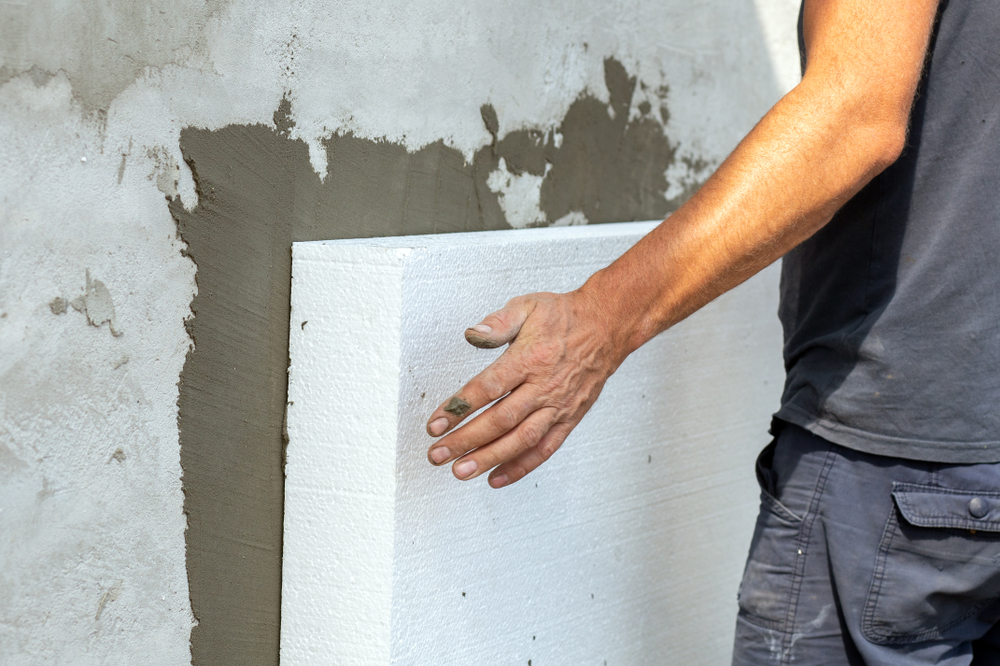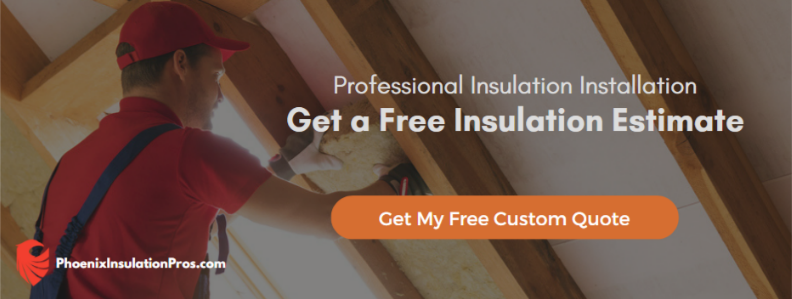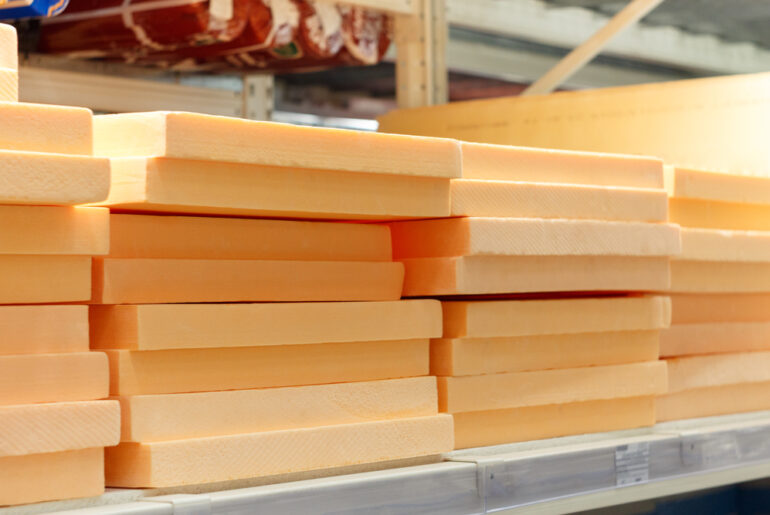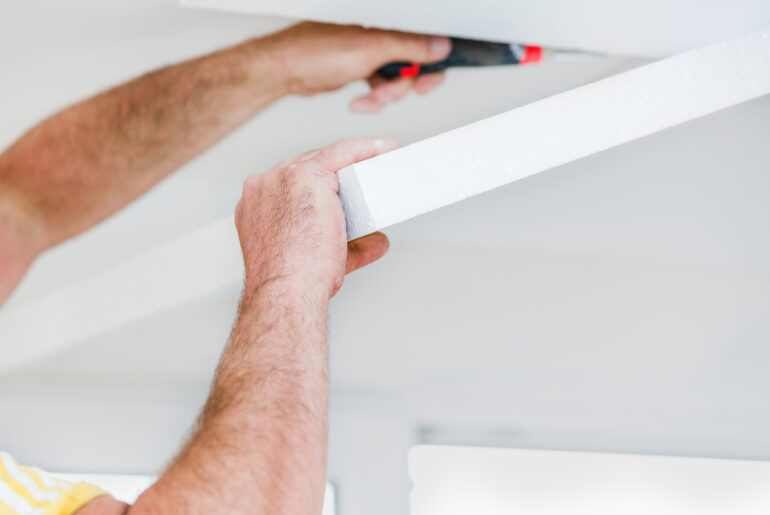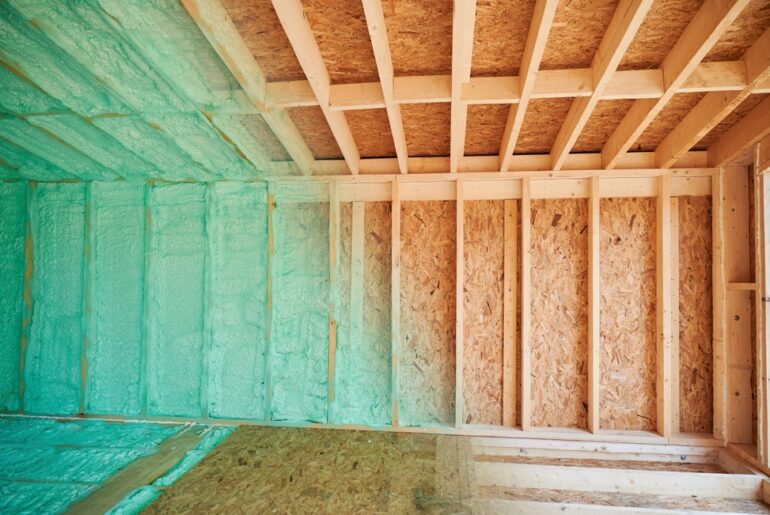When installing a rigid foam insulation project, it’s always a good thing to have close fitting, well-sealed, secure board joints, and a high-grab adhesive to fit it securely in place.
Using a combination of weather-tight tape and adhesives can help ensure that the foam board insulation is effective wherever it is fitted even when you might have to make multiple cuts and joins around numerous service penetrations or other obstacles.
But with so many diverse products on the market, how can you be certain that the glue in the hardware store will work or won’t damage the foam board insulation?
Here’s our guide, in no particular order, to what to use with whichever foam board insulation you are planning to use.
1. Loctite PL 300
Loctite PL 300 is a water-based latex adhesive that is designed to bond most foam insulation boards to each other and to any porous surface, such as timber, drywall, brick, or concrete. It is good for filling any small gaps and can be used to seal around any cold services penetrations, i.e. electrical conduit, water pipes, drain pipes etc.
Reasons to purchase:
It has a high grab quotient which means it sticks quickly, sets in 20 minutes, and is fully cured within a week, so it is ideal for areas where a mechanical fixing, such as a concrete anchor, would be difficult to fit.
It has a low VOC (Volatile Organic Compound) rating and only gives off a mild acrylic smell, so it can be ideal for use in knee-wall, crawl space or other confined areas with limited ventilation.
PL 300 comes in a cartridge and is delivered to the working area with a caulking gun. Once applied it remains tacky for up to 20 minutes depending upon the ambient temperature.
Average cost:
$7.14 per cartridge
Reasons to pass:
It will not bond to film-faced foam board insulation or to polythene. One surface has to be porous, or it will fail. However, it will not burn through or otherwise adversely affect any iteration of foam board insulation.
It should not be applied in the rain or if rain is forecast and will not work in a wet setting.
2. Liquid Nails Heavy Duty Construction Adhesive
Liquid Nails comes in two iterations, Heavy Duty, and Extreme Heavy Duty, and it comes at a fraction of the price of some other market leaders, so it would be a sensible choice for those projects with a limited budget. After all, efficiently insulating your home is all about making savings, and Liquid Nails maker PPG claims that their product will outlast any project if used in the correct way.
Reasons to buy:
This adhesive is only at the top of the value tree because of its low initial cost; however, the high solvent content should give you pause. Used in conjunction with other adhesives Liquid Nails could be a useful addition to the range of glues used in a project, as long as it is selected for appropriate jobs.
It has a rapid setting time of just ten minutes, so you need to be quick when attaching the foam board to the substrate
Average cost:
$3.50-$4.50 dependent upon retailer and bulk purchase offers
Reasons to pass:
It has a high VOC (Volatile Organic Compound) rating and is best used in external locations or very well-ventilated spaces. Prolonged exposure over time may contribute to health problems, particularly if inhaled.
3. Loctite PL Max Premium
Loctite PL Max Premium is a top of the range construction adhesive from Loctite that will stick almost any material to any surface. Recommended for use with either expanded polystyrene foam boards or Styrofoam insulation as long as they are not coated with a polyethylene film. This premium adhesive will bond foam board to uPVC, steel, galvanized steel, ceramics as well as timber, drywall, and masonry.
Reasons to purchase:
It has a rapid grab quotient but is repositionable for 15-20 minutes and cures fully within 24 to 48 hours, dependent upon temperature and relative humidity levels. When using with foam board insulation it works best on cooler days, i.e. when the temperature is lower than 90°F.
It has a moderate VOC rating and should be used in a well-ventilated area. It is ideal for outdoor applications and can be used in the rain and in conditions of high humidity, although trapping moisture behind insulation panels should be avoided whenever possible.
Average cost:
$12.50 per cartridge, often with discounts for bulk buys
Reasons to pass:
The Max Premium brand comes at a premium price, that even with discounts will help to push the budget to the max.
At 4% its VOC level is not considered high, anything over 8% is labeled as a high VOC content. It’s likely that there will be higher VOCs emitted by the paint used on your project.
4. Gorilla Heavy Duty Construction Adhesive
Gorilla Heavy Duty Construction Adhesive is a fast-grab glue that will stick your foam board in place in thirty seconds, so you had best be quick. Ideal for small, enclosed areas as at just 2% it is rated as low VOC, which means you will need little ventilation to safely apply this product.
Reasons to purchase:
Gorilla state that their construction adhesive is an all-weather product that can be applied indoors or out. Damp conditions or high humidity are not a problem for this adhesive, making it a great choice when working in a crawl space that might have some level of moisture to contend with.
It has a rapid set and cure time, giving you confidence that you won’t have to wait long for it to be effective. When gluing light materials such as polystyrene and Styrofoam in place, the thirty-second grab time gives it an advantage when you are applying insulation in hard to access locations.
It has a hybrid chemical composition, which uses neither water nor solvents, which means it is almost immune to shrinkage or cracking and is therefore very good as a gap-filling material up to 1” wide.
Average cost:
$12.00 per cartridge
Reasons to pass:
It has a high sticker price, and that rapid setting time could be problematic. If you have a large area to cover it might be more profitable to find a lower priced alternative.
Like a lot of general adhesives, it won’t bond to bitumen-based substrates as they have similar characteristics to oil and grease. That’s a whole different product range. Also, it will not bond polyethylene or polypropylene, or materials containing high levels of oil or plasticizer, but this should not be a great deterrent.
5. DAP Dyna Grip Foam Construction Adhesive
DAP Dyna Grip Foam Construction Adhesive is specifically designed and made for rigid foam board insulation and is half the price of the equivalent market leader.
Reasons to buy:
Formulated by DAP specifically for foam board installation, Dyna Grip has a rapid grab quotient but remains workable for up to 15 minutes.
Recommended for use with polystyrene, Styrofoam and all other insulation boards it has a low VOC rating.
Average cost:
$3.25 dependent upon retailer and bulk purchase offers. Usually sold in packs of 12 cartridges
Reasons to pass:
It won’t stick two non-porous surfaces together and it is not recommended for use in damp or conditions of high humidity.
The technical data sheet for this product is confusing in that it states the product is not suitable for foam board installations, while also stating that it is unsuitable for any application other than foam board installation. This is most likely a typo as it is sold as a foam insulation construction adhesive.
6. Leech F-13 Construction Adhesive
Leech F-13 construction adhesive is sold as a premium professional product but is usually very reasonably priced. It has good adhesion to wet areas and will not fail should an area become exposed to water ingress.
Reasons to buy:
It has a working time of ten to fifteen minutes with a quarter-inch bead so can be repositioned easily.
Extremely water resistant it is an ideal choice for areas where high humidity levels are an issue. It also performs well at lower temperatures, so if your project is located in a cold climate zone this could be the construction adhesive for you.
Average cost:
$5.50 dependent upon retailer and bulk purchase offers
Reasons to pass:
F-13 is not widely stocked, and is not as popular as other Leech products, which may not be compatible with foam board insulation. If in doubt, always check the manufacturer’s recommendations.
F-13 contains hexane and isopropyl alcohol, which means that it gives off vapors that are flammable, so always ensure good cross-ventilation when in use, and it is not to be used near sparks, naked flame, or other heat source.
Construction Adhesives to Avoid
SikaBond Construction Adhesive
Sika is a great company that makes a wide range of adhesives for industry. Sadly, their Sika Bond range of construction adhesives is not recommended for polystyrene or Styrofoam rigid insulation boards or any polyethylene surface.
Leech F-26 Construction Adhesive
While Leech do make their F-13 Construction Adhesive, which is compatible with foam board insulation, their F-26 product is not to be used with either polystyrene or Styrofoam, or any product containing PVC.

